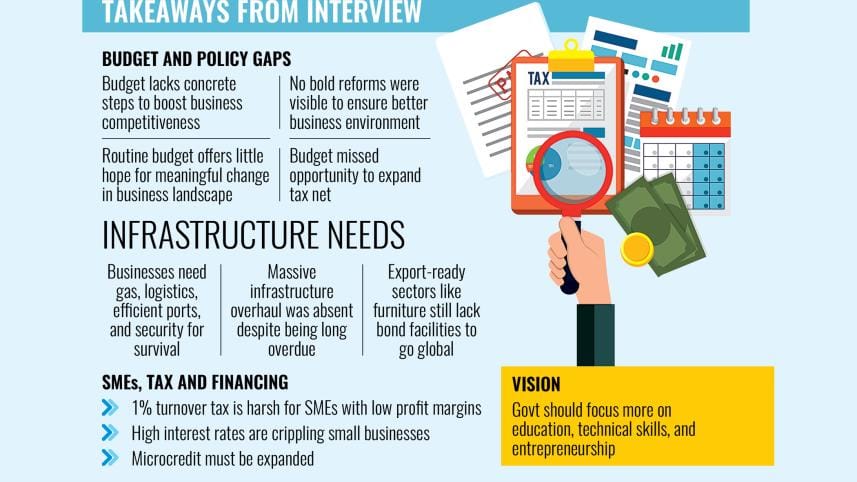Budget falls short on raising industrial competitiveness

The government must prioritise boosting the competitiveness of all industries if it wants to create more jobs, capture a bigger share of global markets, and strengthen the economy.
However, this focus was absent from the national budget for the fiscal year 2025–26, despite hopes from the business community, according to Ahsan Khan Chowdhury, chairman and CEO of Pran-RFL Group.
Speaking to The Daily Star after the budget was announced earlier this month, Chowdhury said the country must strengthen its income-generating sectors to become a developed nation.
"To create thousands of small entrepreneurs and make export-oriented industries more competitive, we needed stronger initiatives such as modernising the Chattogram port and upgrading three other ports to the same standard," said the CEO.
He believes drastic budgetary measures, like a 90-day action plan to increase global competitiveness, could have been taken up. "But that kind of mindset was not reflected in the new budget," he said.
"For example, take the garments industry — a sector that makes up more than 80 percent of exports. Couldn't we have aimed for double-digit growth or doubling the size of it in three years? Absolutely we could," Chowdhury added.
He said businesspeople have long been crying out for reliable electricity and gas to increase exports.
"These are basic necessities for business, just like water and infrastructure. But I didn't see a sincere effort in the proposed budget to bring about the massive infrastructure overhaul we require," he said.

"As a businessman, I face many hurdles just to get a gas supply line extended. I have to go from office to office. It's exhausting. Yet I receive no clear direction about gas. This harms the business environment," said the CEO while sharing his experience.
Chowdhury's Pran-RFL Group is one of the leading local conglomerates. It has an annual turnover of about $3 billion. The group, which includes around 34 companies, employs more than 1.5 lakh people across various sectors. It exports goods worth about $550 million to 145 countries annually.
"As businesspeople, we prefer to put it in bullet points: give us gas, security, efficient ports, better Dhaka–Chattogram connectivity, improved logistics from the north, and protection from extortionists. These don't all have to be in the budget, but the budget should indicate that direction," he added.
According to the businessman, the new budget is much like previous ones, though the people had hoped for something different.
The CEO said people want reforms, fundamental change, fair distribution of wealth, and innovative budget plans that create jobs.
"But from my perspective, this is a conventional, routine budget. I commend those who prepared it, given the many constraints, but I don't think it will bring significant change to Bangladesh's business landscape," he commented.
The businessman said the new budget does not contain fresh efforts to widen the tax net. Without such moves, the government will continue to burden existing taxpayers.
On small businesses, Chowdhury — who is also the chairman of Midland Bank — said he works closely with farmers and rural entrepreneurs. Given the high interest rates, small businesses are under serious strain.
He called for greater access to microcredit to support collective efforts that can move the country forward.
At the same time, he advocated for higher investment in education. "If you compare Bangladesh with Vietnam or the Philippines, their spending on education and health is much higher."
The CEO believes Bangladesh does not need to depend solely on foreign investors.
"We are a country of 18 crore people, with countless capable entrepreneurs who can drive transformation — but they face obstacles. If we want to change the business environment, we must act boldly. Without initiative, we will not unlock new opportunities."
He pointed to sectors such as furniture, which have export potential but still rely mainly on local sales. "Without bond facilities, these industries will never be able to expand into exports. Sectors with export potential should be given bond facilities."
On the increase in turnover tax to 1 percent, he said he views it "very negatively."
"Very few SMEs in Bangladesh make a 10 percent profit margin. A 1 percent turnover tax essentially forces them to pay high effective taxes."
Addressing the NBR, he questioned how much profit small ventures make. "If they have to pay 1 percent on total sales, is that viable?"
He thinks this could create a system of leakages and unhealthy practices. "We waste too much time in this game of thieves and police. We understand the challenges the NBR faces. But we must create opportunities for businesses to grow."
"If we can raise compliance, income levels, and business momentum, we can expand the tax net," added Chowdhury.
He cited Taiwan as an example. "It has a smaller population but exports far more than Bangladesh. That doesn't mean we do not have talent. Bangladesh's youth and workers are incredibly capable."
He admitted that doing business in Bangladesh is extremely difficult.
"But despite all challenges, the country is rising. No matter how hard it gets, how adverse your family's situation is, or how difficult it is to repay loans, keep moving forward. Stay positive. Give the country a chance. Invest here, and through your investment, help move the country forward."
If that happens, he said, the nation may avoid the kind of public outcry seen this year. "Otherwise, one protest will follow another, and we will fail to progress."
The top businessman urged young people to focus on constructive economic development.
"Reforms will come, those responsible will do their part. Your job is to study. Focus on education and technical skills. Focus on the knowledge that interests you."
"Let's drive Bangladesh forward through true economic development. Only then will we see real progress," he concluded.




 For all latest news, follow The Daily Star's Google News channel.
For all latest news, follow The Daily Star's Google News channel.
Comments